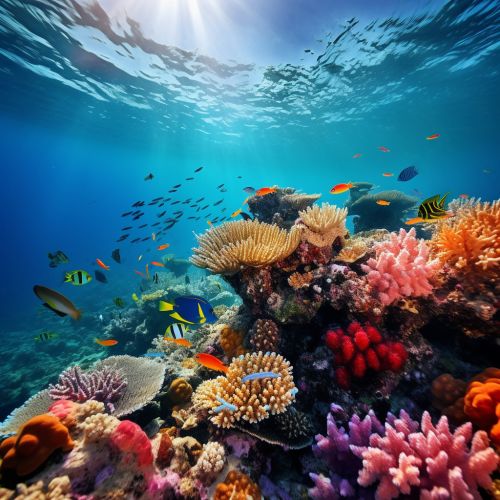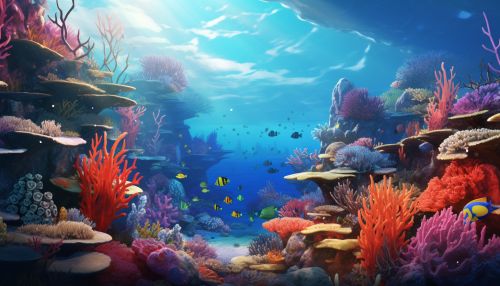Coral Reef Conservation
Introduction
Coral Reefs are one of the most diverse and complex marine ecosystems on the planet. They are home to a multitude of species and play a crucial role in the health of the ocean. However, they are under threat from a variety of factors, including climate change, pollution, overfishing, and destructive fishing practices. This has led to a global effort to conserve and protect these vital ecosystems. Coral reef conservation involves a range of strategies, including the establishment of marine protected areas, restoration efforts, and the development of sustainable fishing practices.


Ecology of Coral Reefs
Coral reefs are made up of colonies of tiny animals known as coral polyps. These polyps secrete a hard exoskeleton of calcium carbonate, which forms the structure of the reef. Coral reefs are found in warm, shallow waters and are known for their high biodiversity. They provide habitat for a wide variety of marine species, including fish, invertebrates, and algae. Coral reefs also play a crucial role in nutrient cycling and carbon sequestration, making them important for the health of the entire ocean.
Threats to Coral Reefs
Coral reefs face a multitude of threats, both natural and anthropogenic. Natural threats include storms, disease, and predation. However, human activities pose the greatest threat to coral reefs. These include climate change, which leads to ocean warming and acidification, both of which can cause coral bleaching and death. Pollution from land-based sources, such as agricultural runoff and sewage, can also harm coral reefs by causing eutrophication and algal blooms. Overfishing and destructive fishing practices, such as blast fishing and cyanide fishing, can also damage coral reefs and deplete their fish populations.
Coral Reef Conservation Strategies
There are a variety of strategies being employed to conserve and protect coral reefs. These include the establishment of marine protected areas, which restrict human activities in order to protect the reef and its inhabitants. Restoration efforts, such as coral transplantation and the use of artificial reefs, are also being used to help damaged reefs recover. Sustainable fishing practices are being promoted to prevent overfishing and reduce damage to the reef. Additionally, efforts are being made to reduce land-based pollution and mitigate the impacts of climate change.
Marine Protected Areas
Marine protected areas (MPAs) are one of the most effective tools for coral reef conservation. MPAs restrict human activities, such as fishing and development, in order to protect the reef and its inhabitants. They can be established by governments or local communities and can range in size from small areas to large regions. MPAs not only protect coral reefs, but also help to sustain local economies by promoting sustainable tourism and fishing practices.
Restoration Efforts
Coral reef restoration is another important strategy for conservation. This can involve the transplantation of healthy corals to damaged areas, or the use of artificial reefs to provide habitat for marine species. Other restoration techniques include the use of coral nurseries and the propagation of corals in laboratories. While these methods can be effective, they are often labor-intensive and expensive, and cannot fully compensate for the loss of natural reefs.
Sustainable Fishing Practices
Overfishing and destructive fishing practices are major threats to coral reefs. Therefore, promoting sustainable fishing practices is a key component of coral reef conservation. This can involve the establishment of fishing quotas, the promotion of selective fishing methods, and the enforcement of fishing regulations. Community-based management approaches, where local communities are involved in the management of their own fisheries, have also been successful in some areas.
Reducing Land-Based Pollution
Land-based pollution, such as agricultural runoff and sewage, can harm coral reefs by causing eutrophication and algal blooms. Therefore, efforts to reduce this pollution are crucial for coral reef conservation. This can involve the implementation of better waste management practices, the promotion of sustainable agriculture, and the restoration of coastal habitats to filter pollutants.
Climate Change Mitigation
Climate change poses a major threat to coral reefs, causing ocean warming and acidification which can lead to coral bleaching and death. Therefore, efforts to mitigate climate change are crucial for coral reef conservation. This can involve reducing greenhouse gas emissions, promoting renewable energy, and implementing strategies to increase the resilience of coral reefs to climate change impacts.
Conclusion
Coral reef conservation is a complex and multifaceted issue, requiring a range of strategies and approaches. While significant challenges remain, there is hope that through concerted global efforts, these vital ecosystems can be protected and preserved for future generations.
